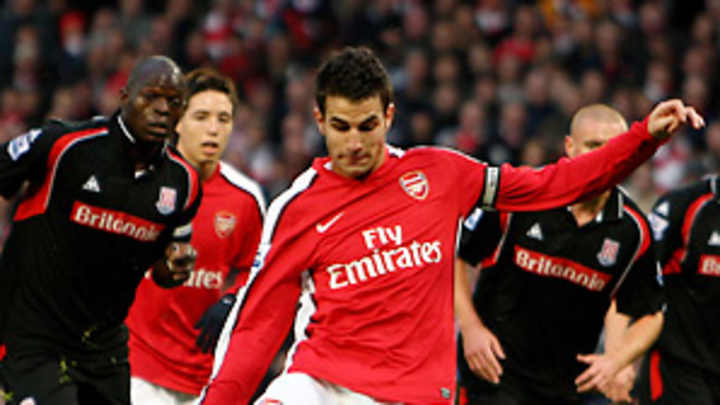Big decision looms for Fàbregas


OK, so since there isn't much going on in the next few months -- Champions League coming back, Copa Libertadores, domestic leagues going down to the wire and that thing we call the World Cup -- it might make sense to get a jump on what could well be one of the stories of the summer: the future of Cesc Fàbregas.
The Arsenal midfielder has a contract through 2014, but we know contracts mean little -- at best, they help determine transfer fees. He has been one of the best central midfielders in Europe for five years now and, at 22, every indication is that he'll be going strong for the next decade. What's more, his club has a history of selling talent at the right price (though, to be fair, rarely talent this young). Gunners boss Arsène Wenger said this week that the club adhered to its own internal wage structure. Fàbregas is already the joint-highest paid player at the Emirates.
Throw in events elsewhere and you can see a perfect storm rising. With elections coming up at Barcelona, the club where Fàbregas grew up, and Real Madrid always in the market for top talent, you can expect plenty of speculation to bubble over. The economics of it are -- relatively -- simple. If the offer is big enough and Fàbregas wants to go, Arsenal will say "yes." Wenger is not about to keep a guy against his will. Nor can he offer Fàbregas an absurd raise, partly because the pay structure won't allow it, partly because he could not match what Barça or Real might give him.
Less simple is what Fàbregas himself may want. You often hear players talking about wanting to join other clubs "to win things." That's playerspeak; it really doesn't mean that much. Yes, winning trophies is nice. But sometimes playing a key role for a club that wins a trophy every few years is more satisfying, personally and professionally, than being a slightly marginal figure for a team that rakes in silverware season after season.
I spent a little time with Fàbregas a few years ago and, even then, what strikes you most is that this is a kid with a 30-year-old's head on his shoulders. His intelligence, confidence and level of maturity are totally out of line with his age. He gives the impression of someone who only cares about salaries as a way of "keeping score" and for whom trophies matter less than performance.
I remember seeing him in the bowels of Vienna's Ernst Happel Stadium after Spain won the European Championship in the summer of 2008. It was a historic triumph and he had done his part in the final against Germany but, looking into his eyes, you almost felt that he did not believe this was his victory. He featured in each of Spain's games, but started just two of them and there was little question that the limelight belonged to the likes of Xavi, David Villa, IkerCasillas and Fernando Torres.
The whole thing appeared somewhat bittersweet, not because Fàbregas can't accept being a role player for the good of the team, but rather because he's a natural leader, a guy who never hides on the pitch. Even when he's playing badly, you see him demanding the ball, shouting at teammates, doing his utmost to carry the side.
That characteristic is why, peering in my crystal ball, I think it's unlikely that he will leave Arsenal this summer. Barcelona may be a bigger club and it may offer him more money, but ultimately, the team belongs to Andrés Iniesta and Xavi. The former is 25, the latter is 30, which means they'll be around for a little while longer. Fàbregas to Barcelona would be a publicity coup, but it wouldn't be the kind of signing that fits. Sure, you could move Iniesta to the wing and leave Xavi alongside Fàbregas with a defensive midfielder behind, but why mess with a formation that works? Why force it? And from Fàbregas' perspective, why join a club where he'd play second banana to Xavi and Leo Messi and, possibly, half a dozen others?
It's not about ability. There is no huge gap between his skills and those of Xavi and Iniesta. In fact, in his head, Fàbregas probably feels equal, if not better. It's the kind of uber-confidence of the very best athletes, the self-belief they can achieve anything. But it's more about belonging. Arsenal was built around him. Arsenal's success is his success. At Barcelona, at least initially, he would be a passenger.
In this day and age, it's hard, if not impossible, to imagine Fàbregas at the Emirates for the rest of his career. That kind of thing just doesn't happen. Even if Arsenal turns into a juggernaut overnight, odds are, at some point, he'll want to return home. And, when he does, Arsenal fans should only be grateful. He has given the club seven years of his life (more by the time he goes) and has repaid the faith shown in him many times over.
It's just that it won't be this summer. Some things are more important to him than money, trophies and playing for the best team in the world.
